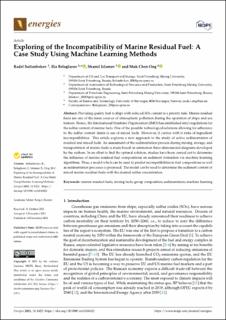| dc.contributor.author | Sultanbekov, Radel | |
| dc.contributor.author | Beloglazov, Ilia | |
| dc.contributor.author | Islamov, Shamil | |
| dc.contributor.author | Ong, Muk Chen | |
| dc.date.accessioned | 2022-02-22T09:11:04Z | |
| dc.date.available | 2022-02-22T09:11:04Z | |
| dc.date.created | 2022-01-11T17:27:59Z | |
| dc.date.issued | 2021-12 | |
| dc.identifier.citation | Sultanbekov, R., Beloglazov, I., Islamov, S., & Ong, M. (2021) Exploring of the Incompatibility of Marine Residual Fuel: A Case Study Using Machine Learning Methods. Energies, 14(24), 8422. | en_US |
| dc.identifier.issn | 1996-1073 | |
| dc.identifier.uri | https://hdl.handle.net/11250/2980705 | |
| dc.description.abstract | Providing quality fuel to ships with reduced SOx content is a priority task. Marine residual fuels are one of the main sources of atmospheric pollution during the operation of ships and sea tankers. Hence, the International Maritime Organization (IMO) has established strict regulations for the sulfur content of marine fuels. One of the possible technological solutions allowing for adherence to the sulfur content limits is use of mixed fuels. However, it carries with it risks of ingredient incompatibilities. This article explores a new approach to the study of active sedimentation of residual and mixed fuels. An assessment of the sedimentation process during mixing, storage, and transportation of marine fuels is made based on estimation three-dimensional diagrams developed by the authors. In an effort to find the optimal solution, studies have been carried out to determine the influence of marine residual fuel compositions on sediment formation via machine learning algorithms. Thus, a model which can be used to predict incompatibilities in fuel compositions as well as sedimentation processes is proposed. The model can be used to determine the sediment content of mixed marine residual fuels with the desired sulfur concentration. | en_US |
| dc.language.iso | eng | en_US |
| dc.publisher | MDPI | en_US |
| dc.rights | Navngivelse 4.0 Internasjonal | * |
| dc.rights.uri | http://creativecommons.org/licenses/by/4.0/deed.no | * |
| dc.subject | marin teknologi | en_US |
| dc.subject | maskinlæring | en_US |
| dc.title | Exploring of the incompatibility of marine residual fuel: A case study using machine learning methods | en_US |
| dc.type | Peer reviewed | en_US |
| dc.type | Journal article | en_US |
| dc.description.version | publishedVersion | en_US |
| dc.rights.holder | © 2021 by the authors | en_US |
| dc.subject.nsi | VDP::Teknologi: 500::Marin teknologi: 580 | en_US |
| dc.source.pagenumber | 1-16 | en_US |
| dc.source.volume | 14 | en_US |
| dc.source.journal | Energies | en_US |
| dc.source.issue | 24 | en_US |
| dc.identifier.doi | 10.3390/en14248422 | |
| dc.identifier.cristin | 1978779 | |
| dc.source.articlenumber | 8422 | en_US |
| cristin.ispublished | true | |
| cristin.fulltext | original | |
| cristin.qualitycode | 1 | |

